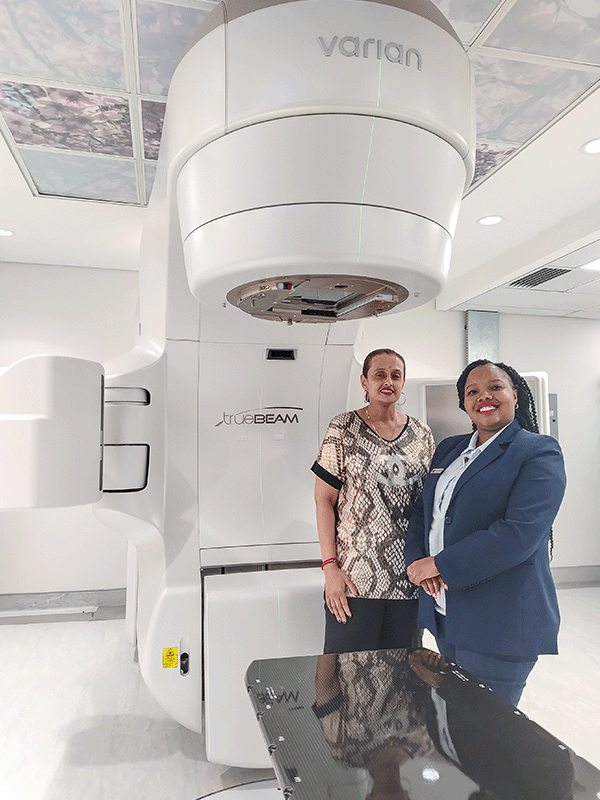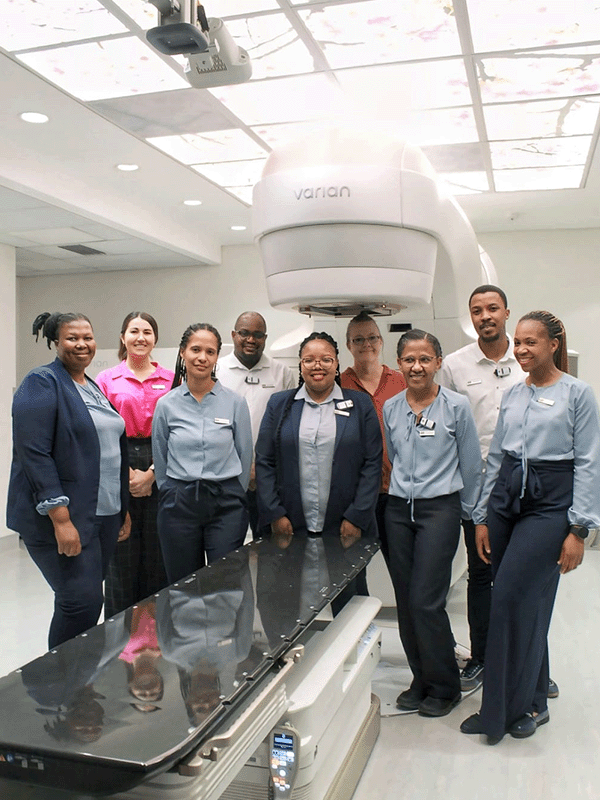Technologically advanced radiotherapy creates hope for cancer patients
Accurately targeting tumours and metastases
The prospects for treating a wide range of cancers have been greatly improved for communities of Johannesburg’s southern suburbs and further afield since the introduction of a sophisticated radiation therapy imaging and delivery system at Netcare Alberton Hospital’s radiation unit.
Clinical oncologists Dr Sylvia Rodrigues and Dr Karen Motilall have been prescribing radiation treatments for their cancer patients requiring this treatment modality, with the Varian TrueBeam™ 4.0 linear accelerator (linac), for the past year and have seen the equipment’s versatility and advantages for patients.
“We are seeing renewed hope with advanced technology like this, which has broad applications for treating tumours all over the body, even in especially hard-to-reach areas or close to other vital structures,” says Dr Rodrigues.
“Among the various types of treatment, the system is equipped to deliver, highly precise doses in stereotactic body radiation therapy [SBRT] offering a non-invasive treatment option, which is especially beneficial for people who are unable to have surgery for their tumours.
“We treat breast cancer, colorectal and gynaecological cancers, head and neck tumours among others. For people with metastatic disease, which is the spread of cancer cells from the place where they first formed to other parts of the body, we can target the metastases with great accuracy, wherever they may be in the body, sparing nearby nerves, healthy tissue and critical structures from radiation.”
“The system has excellent imaging capacity, allowing us to visualise the tumour and its surroundings while treatment occurs and ensuring that the tiniest movement is adjusted for, including the person’s breathing during treatment,” she says.
Demare Wahl, Netcare Cancer Care’s regional medical physics manager for Gauteng adds: “The respiratory gating technology, which is an added technology available on the TrueBeam, allows radiation delivery to synchronise with the patient's breathing cycle, ensuring precise targeting of tumours, even as they move with breathing.
“This is especially important when treating breast cancer, as the breast is very susceptible to movement due to its location close to the lungs. In using the gating technology, we can significantly reduce the radiation dose to the heart and thus improve patient outcomes,” she says.
The Varian TrueBeam system is designed to deliver very precise radiation therapy for cancer treatment. It can adjust the radiation dose to be high and accurately shaped to match the tumour’s exact size and shape. This precision is achieved using features such as Multi-Leaf Collimators (MLCs), which are like a set of movable "fingers" that shape the radiation beam to fit the tumour’s outline, avoiding as much of the healthy surrounding tissue as possible.
The treatment table can tilt and move in various directions, allowing for precise patient positioning, and ensuring the radiation is aimed exactly where it needs to be. Together, these features make it possible to target tumours with sub-millimetre accuracy, improving effectiveness while minimizing damage to nearby healthy tissue.
“Since the new system was installed at Netcare Alberton Hospital’s radiation unit, it has extended the potential for performing complex radiation treatments, improving quality of life, and prolonging life, if not curing cancer, either alone or in combination with chemotherapy or surgery,” Dr Rodrigues says.
“The detailed perspective that the new radiation therapy system provides in visualising tumours enables targeted external radiotherapy treatment for a wide spectrum of cancers, including gynaecological, liver, lung, bone and pancreatic cancers, among others,” adds Dr Motilall.
“At least half of my patients require treatment for cervical cancer, and when prescribing external beam radiation in the pelvic area for this, colon and other cancers, there are many other nerves and organs within narrow confines of the pelvis and the real-time imaging and precision of the new system provides confidence that the radiation dose is focused exactly where it is needed while avoiding healthy tissue,” she says.
Wahl adds that the system has onboard imaging technologies which can create high-quality, real-time images that show the tumour and nearby body structures in 3D, with the added ability to track motion over time, like during breathing. It also uses low-energy X-rays to quickly take images of the patient, making it easy to double-check and adjust their position before treatment. “This enables radiation therapists and oncologists to visualize the target area with unparalleled clarity, allowing them to precisely localise the tumour and tailor treatment plans to suit each patient’s needs,” she says.
“There is more we can do to treat cancer than ever before, so there is more cause for hope than ever.” Radiation therapy unit manager, Busi Mzelem, says that more than 300 people have been treated with the Varian TrueBeam™ since it was installed at the radiation unit at Netcare Alberton Hospital in February 2024.
“Patients find the quicker treatment times more comfortable and more convenient to fit into their daily activities,” she says.
“Our radiation unit is just one component of the person-centred comprehensive cancer treatment services within the integrated Netcare Alberton Hospital, and our experienced and dedicated team is committed to providing professional holistic care for each person,” Mzelem concludes.















